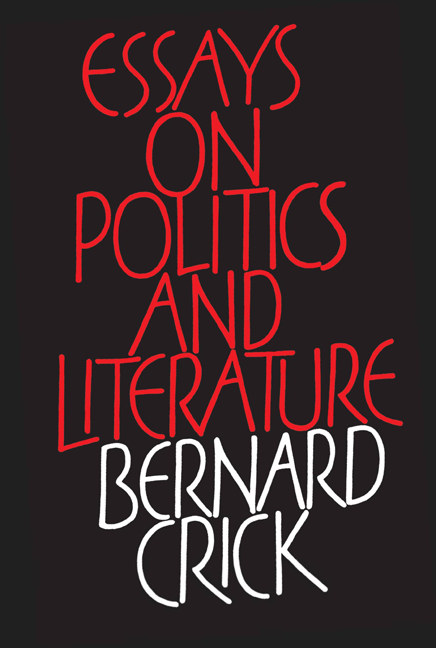Book contents
- Frontmatter
- Contents
- Preface
- Acknowledgements
- Foreword by David Daiches
- One Literature and Politics
- Two The Political in Britain’s Two National Theatres
- Three Young Writers of the Thirties
- Four Koestler’s Koestler
- Five Hannah Arendt: Hedgehog or Fox?
- Six Beatrice Webb as English Diarist
- Seven Words
- Eight My Lse
- Nine Reading The Observer as a Complex Text
- Ten On the Difficulties of Writing Biography and of Orwell’s in Particular
- Eleven Reading Nineteen Eighty-Four As Satire
- Twelve Animal Farm For Schools
- Thirteen Orwell and English Socialism
- Fourteen On the Orwell Trail
- Fifteen Wedekind’s Spring Awakening
- Sixteen Horvath’s Tales From the Vienna Woods
- Seventeen Pinter’s No Man's Land
- Eighteen Polly By Gaslight
- Nineteen Edgar Catches Jenkins’ Ear at the Barbican
- Twenty Barrault at the Barbican
- Index
Nineteen - Edgar Catches Jenkins’ Ear at the Barbican
Published online by Cambridge University Press: 24 September 2020
- Frontmatter
- Contents
- Preface
- Acknowledgements
- Foreword by David Daiches
- One Literature and Politics
- Two The Political in Britain’s Two National Theatres
- Three Young Writers of the Thirties
- Four Koestler’s Koestler
- Five Hannah Arendt: Hedgehog or Fox?
- Six Beatrice Webb as English Diarist
- Seven Words
- Eight My Lse
- Nine Reading The Observer as a Complex Text
- Ten On the Difficulties of Writing Biography and of Orwell’s in Particular
- Eleven Reading Nineteen Eighty-Four As Satire
- Twelve Animal Farm For Schools
- Thirteen Orwell and English Socialism
- Fourteen On the Orwell Trail
- Fifteen Wedekind’s Spring Awakening
- Sixteen Horvath’s Tales From the Vienna Woods
- Seventeen Pinter’s No Man's Land
- Eighteen Polly By Gaslight
- Nineteen Edgar Catches Jenkins’ Ear at the Barbican
- Twenty Barrault at the Barbican
- Index
Summary
I have tried hard to get away from this self-destructive infatuation, this obsessive love-hate relationship which stops me writing bold, original, serious and interesting things about institutionalised higher education. Next week I promise to turn to another institution, though one equally obsessive and easy to get lost in— North London Polytechnic. What draws me back to the Barbican is not just that David Edgar's huge new play Maydays raises fascinating issues concerning the nature of both theatre and politics, but also an extraordinary issue of responsibility in journalism.
The play has had an exceptionally mixed reception. Mixed both in that some critics have disliked it strongly and others admired it greatly, and in that some have reported a mixed reaction—not merely a good in parts’ reaction but a puzzled, conditional reaction.
For once I am with the mixed economy men and the Social Democrats. I’m in the middle and I can't make up my mind. Go and see it, and make up your own mind; it is very, very good in parts—funny, noble even, with some dramatically effective scenes; and yet some strident, simple, cardboard cut-out and arse- achingly prolonged scenes.
In other words, it is a piece of epic theatre: it is very long (two intervals!), it has many different scenes and it portrays fictional individuals in real historical events in different countries over a long period, from 1945 to 1983 to be precise, from a flag-waving, mock heroic Communist Party victory demonstration to the women on Greenham Common.
It is a study of the extreme Left, or rather of extreme Left groups (the plural is very important, and was missed by some critics whose eyes were blinded by blood and rage). He attributes to them both nobility and folly. So many characters are involved that characterisations become humours, and there is little psychological depth; but recognising so many of the humours as typical, the roles that people have played in my political lifetime, I found some of the scenes both wildly funny and sadly terrible.
Yet one soft-centrist had no mixed response. The political editor of The Guardian, Peter Jenkins, ‘devoted half a page (he has not used that sort of space since the Falklands War) to an extraordinary attack on David Edgar (October 26, 1983):
- Type
- Chapter
- Information
- Essays on Politics and Literature , pp. 251 - 253Publisher: Edinburgh University PressPrint publication year: 2020



